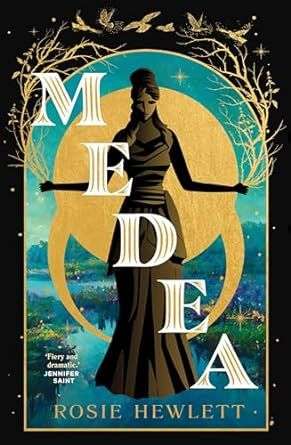
For all things fantasy, horror, and speculative fiction

Review Details
Review type: Book
Title: Medea
Author: Rosie Hewlett
Publisher: Bantam Books,
Release date: 21st March 2024

Reviewed by: Sarah Deeming
Other details: Hardback, £9.00
Medea by Rosie Hewlett
Book Review
Sarah Deeming
Medea is a prisoner in her father’s house, Aeetes, King of Colchis. Where once he reviled her for her magic, now he guards her as jealously as he protects the Golden Fleece because she is the true source of his power. When Jason and the Argonauts arrive searching for the Fleece, Medea jumps at the opportunity and makes a deal with Jason. She will help him overcome the trials to claim the Fleece from Aeetes, and Jason will take Medea with him when he leaves. But life is not any better for Medea once she is free of her father, as she is feared throughout the world as a witch who isn’t afraid to kill to get what she wants. And Jason is not the hero the stories paint him to be. When Medea realises how he has betrayed her after her years of faithfulness…well, there are only so many times you can be called an evil witch before you decide to own that title.
It seems the book market is flooded with retellings of myths and legends that have predominantly been told from the male perspective, and women are reduced to stereotypes. And I am all for these re-examinations of old stories. I have found that some are more successful than others as the author is constrained by the original story and the places and characters in it. Medea is one of the successful ones, in my opinion, because there is a wide range of characters and locations that affect Medea’s development.
Medea is depicted as a naïve young woman, which makes sense as she is kept a prisoner by her father and isolated from people who might help her gain agency. Although many people warn her about Jason, Medea can’t see him for the gas-lighting user that he is, only his good looks and charming personality. But then she wouldn’t because she is only used to men who manipulate through fear and a fist, and not through charm and cunning words. In fact, it is her relationship with Jason that really makes the story sing. The clever way he manipulates her actions and twists his words and her understanding brings depth to their relationship because, even if you don’t know Medea’s story, you can see how it will go for her.
Medea is not depicted as perfectly innocent and a victim of her circumstances either. She makes choices, sometimes manipulated by Jason, sometimes on her own, that are downright evil, but Hewlett doesn’t excuse Medea from her bad choices by painting her as a victim of her upbringing, which I admire. Medea is a product of her experiences and her power, not a poor little victim. I enjoyed her strong character.
We can’t do a review of Medea without mentioning the way (spoiler alert) she kills children because she does, and if this is the sort of thing that triggers you, you have been warned. This section of her story is told without sensationalism or gratuitously but with sympathy and pain, as it should be. It is shocking and very sad, and this is reflected in Medea’s change afterwards.
I devoured Medea. The writing style is clean and punchy, moving the narrative along at a good pace and highlighting many small toxic masculine traits without being a man-hating feminist story. There are good men whose reactions to Medea are based on her actions, whether good or bad and then there are those who value women as property and overlook them or give other men the praise when it should have gone to a woman. It is a really clever book, and I couldn’t put it down.
All reviews
Latest Reviews:
- Rose/House by Arkady Martine
- Pendragon RPG: The Sauvage King
- Januaries by Olivie Blake
- Basic Roleplaying: Creatures
- Five Mini-Adventures – PDF (Shadowdark RPG)
- Cursed Scroll Zine, Vol. 1: Diablerie! RPG Zine
- Empire of the Dawn by Jay Kristoff
- The God and the Gumiho by Sophie Kim
- Citadel of the Moon by Mike Chinn
- Hemlock and Silver by T. Kingfisher
Review tags:
Action (49) Adventure (70) Contemporary Fantasy (19) Fantasy (120) Gothic Horror (12) Harper Voyager (12) Historical Fantasy (14) Hodderscape (12) Horror (77) Orbit Books (33) Romance (28) Romantasy (13) Science Fiction (35) Titan Books (36) TorDotCom (13)
Leave a Reply